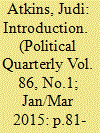|
|
|
Sort Order |
|
|
|
Items / Page
|
|
|
|
|
|
|
| Srl | Item |
| 1 |
ID:
138274


|
|
|
|
|
| Summary/Abstract |
Following the inconclusive result of the last general election, David Cameron made a ‘big, open and comprehensive offer’ to Nick Clegg to form a partnership government. Four days later, on 11 May 2010, Britain had its first peacetime coalition since the 1930s. Despite widespread predictions to the contrary, the Conservative–Liberal Democrat government has survived for a full parliamentary term. While its period in office was marked by bitter disagreements over issues such as constitutional reform and Europe, it is equally clear that the two parties were able to work well together in other areas, notable among which are education and foreign policy. This raises a number of questions. Why did certain initiatives prove to be particularly contentious? Conversely, why was cooperation on other policies relatively straightforward? How did the two leaders seek to manage conflict within and between their respective parliamentary parties? What was the longer-term impact of the Coalition on Britain's constitutional arrangements?
|
|
|
|
|
|
|
|
|
|
|
|
|
|
|
|
| 2 |
ID:
123773


|
|
|
|
|
| Publication |
2013.
|
| Summary/Abstract |
Some commentators have observed that today's Cabinet ministers are younger and less experienced than their predecessors. To test this claim, we analyse the data for Labour and Conservative appointments to Cabinet since 1945. Although we find some evidence of a decline in average age and prior experience, it is less pronounced than for the party leaders. We then examine the data for junior ministerial appointments, which reveals that there is no trend towards youth and inexperience present lower down the hierarchy. Taking these findings together, we propose that public profile is correlated with 'noviceness'; that is, the more prominent the role, the younger and less experienced its incumbent is likely to be. If this is correct, then the claim that we are witnessing the rise of the novice Cabinet minister is more a consequence of the personalisation of politics than evidence of an emerging 'cult of youth'.
|
|
|
|
|
|
|
|
|
|
|
|
|
|
|
|
| 3 |
ID:
161676


|
|
|
|
|
| Summary/Abstract |
This article treats Enoch Powell's ‘Rivers of Blood’ speech as an example of the epideictic rhetoric of blame and exclusion. Drawing on a framework proposed by Celeste Michelle Condit, the analysis explores the functions of the address for the speaker and for the audience. Of particular concern are Powell's self‐presentation as a statesman and prophet; his account of the impact and consequences of unrestricted immigration; and his portrayal of a community where ordinary, decent English people were being displaced and victimised by Commonwealth immigrants—a process in which he claimed the authorities were complicit. For the audience, the speech gave public expression to their concerns about immigration, though Powell's predictions of a dystopian future also aroused sentiments of anger and foreboding. Despite the controversy that ensued, the impact of ‘Rivers of Blood’ was far‐reaching, and its influence is still apparent in contemporary debates over immigration.
|
|
|
|
|
|
|
|
|
|
|
|
|
|
|
|
| 4 |
ID:
138275


|
|
|
|
|
| Summary/Abstract |
Following the formation of the Conservative–Liberal Democrat government in May 2010, David Cameron and Nick Clegg sought to persuade party members, the electorate and a sceptical media that their partnership would hold together for the duration of the parliament. Taking as its starting point Kenneth Burke's theory of rhetoric as identification, this article explores the strategies employed by senior Coalition figures to construct and present an image of unity to these different audiences. Of particular concern are appeals to the parties’ shared values and to the ‘national interest’, as well as the narrative of Britain's ‘debt crisis’. This narrative served to minimise inter-party divisions by inviting MPs and supporters to unite behind the cause of deficit reduction, in opposition to the ‘fiscally irresponsible’ Labour party that had allegedly wrecked the economy. The article concludes by reflecting on the lessons for the partners in a future UK coalition government.
|
|
|
|
|
|
|
|
|
|
|
|
|
|
|
|
|
|
|
|
|